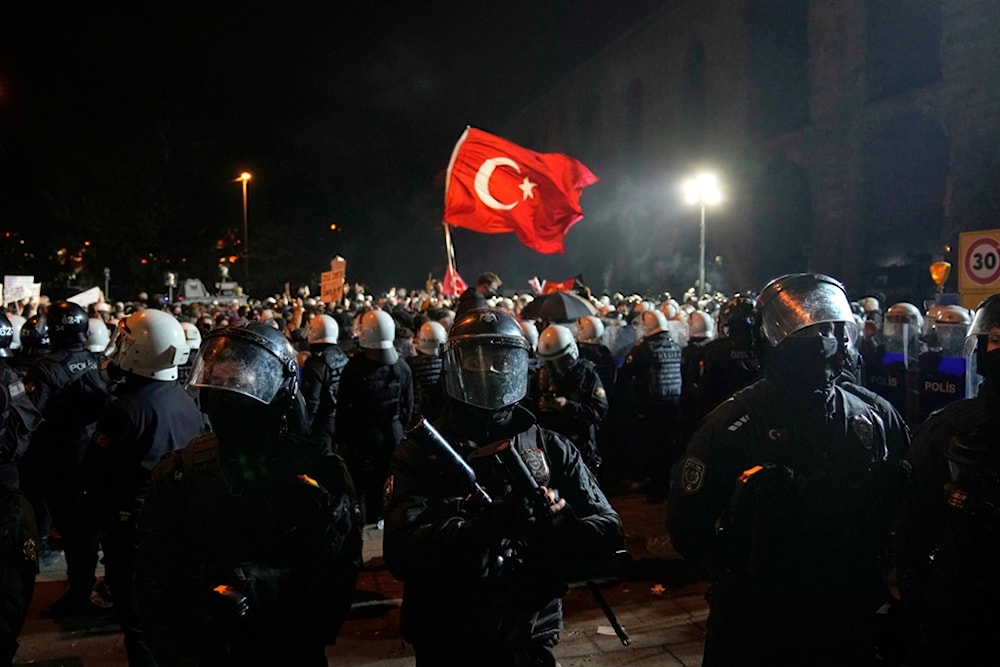Türkiye bonds rally as investors look past political turmoil
Despite concerns that political tensions could disrupt economic strategy, Erdogan's administration has taken steps to reaffirm its commitment to fiscal and monetary orthodoxy.
-

Anti riot police officers take positions during a protest after Istanbul's Mayor Ekrem Imamoglu was arrested and sent to prison, in Istanbul, Türkiye, Monday, March 24, 2025 (AP Photo/Khalil Hamra)
Türkiye's financial markets appear to be regaining investor confidence even as the country faces fresh political turmoil. Following the arrest of Istanbul Mayor Ekrem Imamoglu, a prominent opposition figure and potential challenger to President Recep Tayyip Erdogan, Turkish assets initially took a hit. However, according to a Bloomberg report, markets have since bounced back, buoyed by signals that economic policy will remain on its current path.
Dollar-denominated sovereign bonds have outperformed those of other emerging markets, with at least 17 Turkish securities landing among the top 20 in Bloomberg's Emerging Markets Sovereign Total Return Index. One bond maturing in May 2047 climbed by 0.6 cent on the dollar. Meanwhile, Türkiye's credit default swaps narrowed by 17 basis points, the sharpest single-day contraction since March 2024, Bloomberg reported.
Reassuring Investors
Despite concerns that political tensions could disrupt economic strategy, Erdogan's administration has taken steps to reaffirm its commitment to fiscal and monetary orthodoxy. The president publicly backed the economic team led by Finance Minister Mehmet Simsek, dismissing rumors of Simsek's possible resignation. "The main question is whether the political noise will derail or not the economic agenda and all the orthodox policies put in place since late 2023," said Guillaume Tresca, global EM strategist at Generali Investments. "President Erdogan has been clear it will remain in place and rumours of Simsek's resignation have been dismissed."
The central bank's actions to stabilize the Turkish lira — which is hovering around 38 to the dollar — have been interpreted as further evidence that authorities intend to stick with more conventional policy tools. "This time, the approach is much different. It's coherent so far with orthodoxy," Tresca told Bloomberg, comparing the recent interventions to the more passive response during the 2018 currency crisis.
Read more: Turkish stocks rebound amid Imamoglu’s arrest, short-selling ban
For global investors, the key issue is whether public demonstrations sparked by Imamoglu's arrest begin to affect Türkiye's economic performance. "What foreign investors care about from an economic perspective is at what point do the protests start to hurt economic activity and growth," said Martin Bercetche of Frontier Road, also speaking to Bloomberg.
Growing Lender Confidence
Adding another layer of confidence, Türkiye's Wealth Fund (TVF) announced on Tuesday that it has secured a syndicated loan totaling €1.1 billion ($1.19 billion) — its first without a treasury guarantee. The loan, arranged with participation from 20 banks across 12 countries, includes a €837 million tranche and a $285 million tranche, according to a statement. The euro portion is priced at 2% above the Euribor rate annually, while the dollar portion will pay 2.25% over SOFR.
Together, these developments suggest that investors are willing to look past short-term political instability, focusing instead on whether the government continues to uphold the market-oriented reforms introduced since late 2023.

 3 Min Read
3 Min Read








